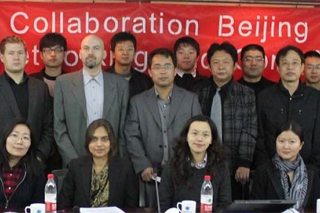Archive
for April, 2012
Future Wireless Networking and Core Network
Apr 09 2012The research projects and collaboration within the Future Wireless Networking and Core Network thematic area targets to create innovations and new solutions towards increased energy-, spectral – and cost-efficiency in future mobile communication networks. This includes e.g. development of new architectures of future mobile networks, interference management methods for future wireless networks, future green wireless communications, key technologies for future IPv6-based core network as well as testing and evaluation methodologies for future wireless networks.
The Energy and Cost Efficiency in Wireless Access (ECEWA) project is strategic Sino-Finnish collaboration initiative targeting to develop new cost and energy efficient solutions to future radio access networks. The use of emerging features such as femto cells, relays, and coordinated multipoint will require changes to the ways radio access networks are planned. Energy consumption of the network equipment has become increasingly important. The mobile network industry is looking ways to reduce the carbon dioxide emissions by improving the energy efficiency of the base station equipment. Energy efficiency of the networks will also impact on the way networks should be planned and operated. Saving energy also saves costs. Hence its natural and important to study the cost and energy efficiency jointly. The research is carried out in close cooperation with the participating Finnish and Chinese universities, research institutes and companies operating in the mobile devices and networks field to facilitate high-impact scientific work as well as societal impact through standardization contributions.
Future Wireless Access
Apr 09 2012The wireless access networks projects develop the core technologies for future wireless connectivity with the aim beyond the existing systems. The key challenges include the increasing data rates and requirements for improved connectivity. Therefore, solutions for capacity and coverage improvement are needed.
Networks of 2020 (NETS2020) project is a strategic wireless communication system research project covering the future development and evolution of cellular communication systems including IMT-Advanced (IMT-A), its further evolution and its integration with other communication and data networks. The main emphasis is on evolving wireless network topologies, such as relay based and device-to-device connections, and on distributed algorithms performing automated network management tasks on networks with such novel topologies. The research is carried out in close cooperation with the best Chinese universities and research institutes in the field to enable smooth application of the technology in evolving standards.
The JADE project is a strategic research project funded by Tekes, VTT, and several industry partners in Finland. The main objective of the JADE project is to investigate the energy consumption problem in the heterogeneous structure of International Mobile Telecommunications (IMT)-Advanced systems, and to design and develop novel link and system level solutions leading to significant energy efficiency improvement in 3GPP Long Term Evolution (LTE) and LTE-Advanced systems.
The JADE project is conducted under the Sino-Finland ICT Alliance Framework, which is initialized by Ministry of Employment and Economy at Finland and Ministry of Science and Technologies at China from June 2010. The Chinese research partners of JADE include Shanghai Research Center for Wireless Communications, Beijing University of Posts and Telecommunications, University of Electronic Science and Technology of China, etc.
Future Services
Apr 01 2012The UBISERVE-project (Research on Future Ubiquitous Services and Applications) is a joint research effort dedicated to advance research in the field of ubiquitous services (Ubiservices). The project will reinforce the work of Finland China ICT Alliance through constructing service enabling environments, developing test environments in real-life settings and by coordinating the information on other facilities, tests and demonstrations and expertise within the ICT Alliance.
The activities include living-labs based research on mobile and ubiquitous media innovation and constructive research on transmission algorithms and service overlay architectures. Furthermore, specific focus is on activities that combine the complementary expertise and capabilities of the Chinese and Finnish partners and enable joint research, testing and studies of ubiquitous services.
The UBISERVE-project is implemented as parallel sub-projects of three Universities: University of Jyväskylä (JYU), Aalto University (AALTO) and Tampere University of Technology (TUT).



